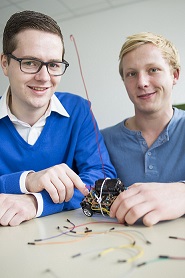Electrical Engineering
Overview

Nowadays, Electrical Engineering is omnipresent. Hardly any other technical discipline has such a significant influence on our daily lives.
Computers, satellites and data networks carry the information society; modern electrical engineering provides clean and safe cars and revolutionises medicine; sustainable and intelligent energy systems contribute to the conservation of the environment. But these comforting things in our daily lives have to be developed, constructed, manufactured, reviewed for their environmental performance, sold, used and subsequently recycled.
Of course, Electrical Engineers ensure the generation of electricity as well as accessibility for industry and consumers. Especially in this field you can face new challenges to provide sustainable energy production.
Job profile
This study course enables students to take up technical and managerial posts as well as key positions in the fields of Electrical Engineering, Electronic Engineering and Computer Science. Typical fields of work are as follows:
- construction and development of devices for industrial applications and private consumers
- integration and verification of various systems and system components
- quality assurance in a testing station
- technical sales and application advice
- coordination tasks and project management in middle management with clients and suppliers
- complex managerial tasks including interdisciplinary competences
After graduation, students are qualified to begin master’s degree courses in electronic technologies in one of the specialisation studies of “electrical engineering” or “communication technology and microelectronics” at their own or another university.
